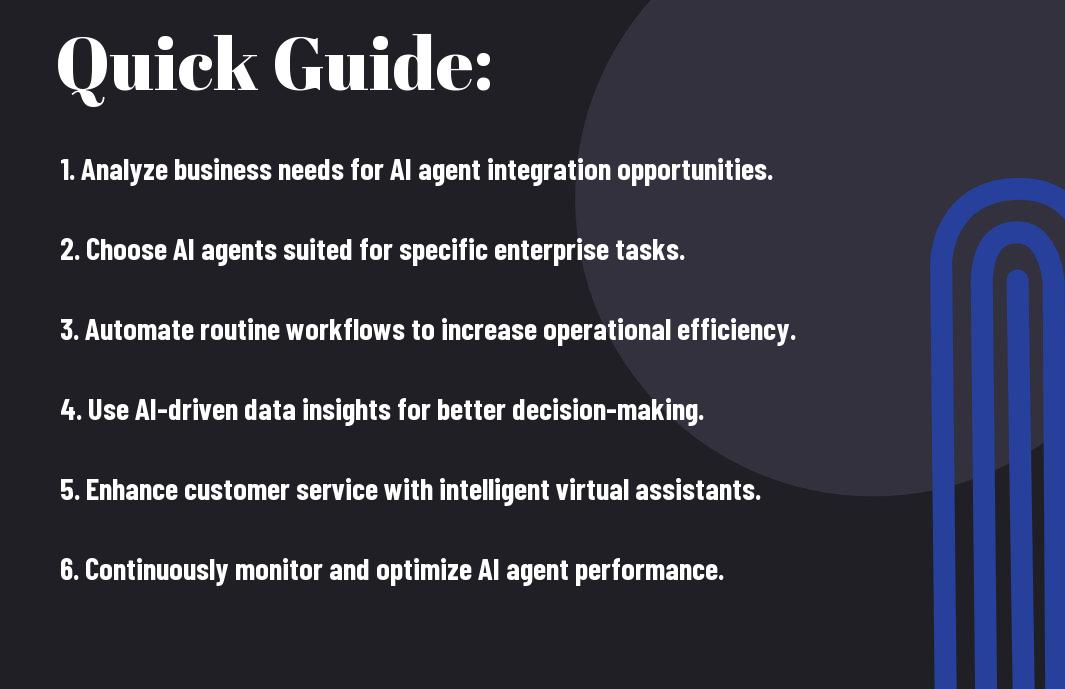Over the past few years, AI agents have become integral to streamlining enterprise operations and enhancing efficiency. In this guide, you will explore how these intelligent systems are transforming your work environment by automating repetitive tasks, improving decision-making, and providing actionable insights. While there are some challenges and risks associated with their implementation, understanding the potential of AI can lead to significant advancements in your organization. Join us as we explore practical insights that will empower you to leverage AI agents effectively.

Key Takeaways:
- AI agents enhance efficiency in enterprise operations by automating routine tasks, allowing employees to focus on more strategic activities.
- Data-driven decision-making is significantly improved with the integration of AI agents, as they can analyze large datasets and provide actionable insights.
- Collaboration between AI agents and human workers leads to improved innovation, as AI can identify trends and patterns that human teams can leverage for growth.
Redefining Workforce Dynamics
Shifts in workforce dynamics are evident as AI agents take on roles previously held by humans. This transformation reshapes job responsibilities, pushing employees toward engaging in higher-value tasks that require creativity and critical thinking. With AI handling tedious and repetitive duties, leaders can expect improved job satisfaction and productivity, ultimately leading to a more agile and efficient organization.
The Shift from Human-Centric to AI-Augmented Roles
Many organizations now integrate AI into their teams, moving from purely human-centric to AI-augmented roles. This transition allows human employees to collaborate with AI systems, leading to faster decision-making and enhanced problem-solving capabilities. By utilizing AI’s analytical power, your team can gain insights that were previously difficult to achieve.
Empowering Employees through Augmented Intelligence
Augmented intelligence empowers employees by providing them with tools and resources to excel in their roles. When armed with AI-driven insights, you can make informed decisions that enhance your performance and productivity. Businesses recognize each employee’s potential, enabling them to leverage AI tools and expertise to elevate the overall work experience.
As organizations adopt augmented intelligence, the focus shifts toward providing employees with real-time access to data and analytics. For example, sales teams can utilize AI to identify potential leads, enabling you to focus on strategic outreach rather than sifting through countless records. Furthermore, AI can analyze market trends, allowing you to tailor your approach dynamically. This ongoing collaboration between people and AI not only boosts your confidence in decision-making but also reinforces a culture of innovation that thrives on collective intelligence.

Streamlining Decision-Making Processes
AI agents significantly enhance decision-making within enterprises by providing intelligent automation and real-time insights. By analyzing vast datasets, they equip you with contextually relevant information that reduces human error and expedites the decision-making process. Companies leveraging AI, such as IBM, have reduced the time spent on strategic decisions by up to 50%, showcasing AI’s potential to enable quicker, more informed choices.
Data-Driven Insights: Leveraging AI to Enhance Agility
Integrating AI into your business processes allows for data-driven insights that enhance your agility and responsiveness to market changes. AI systems can analyze patterns and trends in real-time, enabling your team to adjust strategies promptly based on actionable insights. By utilizing tools like natural language processing, AI can sift through news articles or customer feedback, alerting you to emerging opportunities or potential risks.
The Role of Predictive Analytics in Strategic Planning
Predictive analytics transforms strategic planning by using historical data to forecast future outcomes and trends. This approach empowers you to allocate resources more effectively and to prepare for potential market shifts before they occur.
By employing predictive analytics, organizations can anticipate customer behaviors and emerging trends with remarkable accuracy. For instance, retailers employing AI-driven analytics report a reduction in inventory costs by as much as 30% while simultaneously improving customer satisfaction. With models predicting everything from sales forecasts to market demands, tools like Salesforce’s Einstein can propel your strategic planning efforts, providing foresight that enables you to act rather than react. The ability to visualize various scenarios helps refine your strategies, ensuring that your organization remains resilient and adaptable in a competitive landscape.
Innovating Customer Experiences with AI
AI is reshaping customer experiences by enabling businesses to deliver tailored solutions that enhance satisfaction and loyalty. With advanced algorithms and data analytics, organizations can understand consumer behavior and preferences, allowing for more engaging interactions across various touchpoints. From personalized recommendations to AI-driven chatbots, companies are leveraging technology to create seamless, responsive customer journeys that cater to individual needs.
Personalization at Scale: Meeting Modern Consumer Expectations
Your customers expect personalized experiences that resonate with their preferences and behaviors. AI effectively analyzes vast amounts of data to uncover insights about consumer habits, enabling you to deliver bespoke content, product suggestions, and targeted marketing campaigns effortlessly. By harnessing machine learning algorithms, you can engage your audience with tailored offers, enhancing customer loyalty and satisfaction.
Automation’s Impact on Customer Support Efficiency
Incorporating AI into customer support not only streamlines processes but also elevates service levels. With automated systems capable of handling routine inquiries, your support teams can focus on more complex issues that require human intervention. This leads to quicker response times and improved resolution rates, ultimately enhancing customer satisfaction.
For instance, organizations utilizing AI chatbots can resolve up to 80% of repetitive questions autonomously, providing customers with instant answers without human effort. This frees up your support staff, allowing them to address higher-level concerns, and leads to a 40% increase in overall efficiency. AI tools track interactions and customer sentiments, enabling you to fine-tune your support strategy and develop insights that contribute to a more targeted and effective service approach. By investing in AI support solutions, you maintain responsiveness in a fast-paced market environment while ensuring your customers feel valued and heard.
Operational Efficiency: AI in Supply Chain Management
AI’s integration into supply chain management is revolutionizing operational efficiency. By analyzing real-time data, AI algorithms empower you to make informed decisions, optimize inventory levels, and enhance logistics operations. These technological advancements lead to increased productivity, quicker response times, and improved customer satisfaction, effectively reshaping the landscape of supply chain management.
Real-Time Monitoring and Predictive Maintenance
With AI-driven real-time monitoring, you gain visibility into every aspect of your supply chain operations. This technology helps in predicting equipment failures before they happen, allowing you to schedule maintenance proactively. Predictive maintenance not only reduces downtime but also extends the life of your assets, ensuring smoother operations and significant cost savings.
Reducing Costs through Intelligent Resource Management
Intelligent resource management utilizes AI to analyze and allocate resources efficiently, drastically reducing operational costs. By assessing demand patterns and resource availability, you can minimize waste and enhance productivity. This optimization leads to streamlined processes that align perfectly with market requirements, enabling your enterprise to maintain a competitive edge.
Many enterprises have experienced impressive results through intelligent resource management powered by AI. For instance, manufacturers leveraging AI technologies have reported savings of up to 20% in operational costs. This efficiency arises from better inventory management, as AI can dynamically adjust stock levels based on predictive analytics, aligning production schedules with actual demand. Additionally, automating routine tasks frees up human resources to focus on strategic initiatives, ultimately fostering innovation while reducing overhead costs. In a market where every cent counts, these AI-driven insights can be the difference between success and failure.
Navigating Ethical Considerations in AI Deployment
Ethical considerations are paramount in AI deployment, particularly as organizations adopt these technologies to enhance efficiency and productivity. You face the challenge of ensuring that AI applications are not only effective but also align with ethical standards and societal values. There’s a fine line between leveraging AI for innovation and allowing algorithms to lead to biased or discriminatory outcomes. It’s important to integrate ethical frameworks from the outset to safeguard against potential pitfalls such as privacy invasion and unfair disadvantage to certain groups.
Balancing Innovation with Accountability
Striking a balance between innovation and accountability is vital as you implement AI solutions. Rapid advancements in technology can outpace regulatory frameworks, leading to potential misuse or unforeseen consequences. By establishing clear accountability measures and ethical guidelines, you can foster an environment that encourages responsible AI development while still driving innovation. Organizations that embed accountability into their AI practices not only minimize risks but also position themselves as leaders in ethical tech development.
Building Trust through Transparency in AI Operations
Establishing transparency in AI operations serves as a foundational pillar for gaining trust among stakeholders. Clear communication about how AI systems function, including the data being used and the decision-making processes involved, empowers users to feel more secure and informed about AI applications. Facilitating open dialogue regarding algorithm performance and its societal impact enables a collaborative approach to addressing concerns and expectations.
Transparency is not just good for optics but can significantly influence your organization’s bottom line. For instance, companies that proactively share AI methodologies and data sources have witnessed a 30% increase in employee engagement, as team members feel more connected to and confident in the technology they’re using. Furthermore, research indicates that consumers are 60% more likely to trust brands that are open about their AI practices, which can translate into higher customer loyalty and a stronger market position. By championing transparency, you not only mitigate risks but also cultivate a culture of trust and innovation that can drive long-term success.
To wrap up
To wrap up, understanding how AI agents transform enterprise operations is necessary for harnessing their full potential in your organization. By leveraging AI, you can streamline processes, enhance decision-making, and improve overall efficiency. As you explore these advancements, keep in mind that adopting AI is not just about technology; it’s about reshaping your business strategy to stay competitive. For further insights, check out How AI Agents Transform Enterprise Operations to guide your journey into AI integration.
FAQ
Q: How are AI agents improving decision-making in enterprise operations?
A: AI agents enhance decision-making in enterprises by analyzing large volumes of data quickly and accurately. They employ machine learning algorithms to discern patterns and trends that may not be immediately noticeable to human analysts. By providing predictive analytics, AI agents enable businesses to make informed strategic decisions, reduce risks, and identify opportunities for growth. This capability enhances operational efficiency as it minimizes the time spent on data analysis and allows teams to focus on implementing initiatives that drive performance.
Q: What are some practical applications of AI agents in transforming enterprise operations?
A: AI agents are utilized in various aspects of enterprise operations, including customer service, supply chain management, and human resources. In customer service, AI-driven chatbots can handle inquiries, offering prompt support and freeing up human agents for more complex issues. In supply chain management, AI systems can forecast demand and optimize inventory levels, thus reducing costs and improving service levels. In human resources, AI aids in recruitment processes by screening resumes and matching candidates to job descriptions efficiently, ultimately enhancing the recruitment timeline and workforce quality.
Q: What challenges do enterprises face when implementing AI agents in their operations?
A: Enterprises encounter several challenges when integrating AI agents into their operations. One significant challenge is ensuring data quality and accessibility, as AI systems rely heavily on accurate and comprehensive datasets to function effectively. Additionally, there may be resistance from employees who fear job displacement or lack understanding of AI’s role in the workplace. There are also security concerns related to data privacy and compliance with regulations. Organizations must address these obstacles through training, transparent communication, and robust data governance to maximize the benefits of AI integration.











